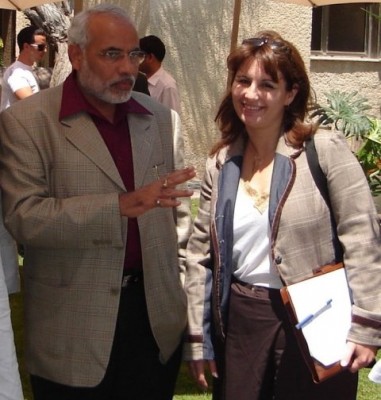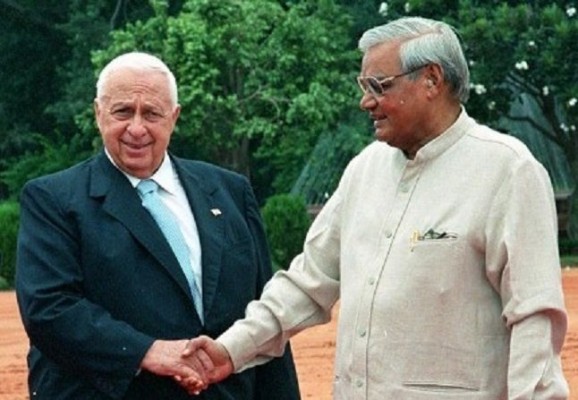M Wadood Sajid
The very same day, 18 October, when Prime Minister Narendra Modi compared India’s surgical strikes against Pakistan with Israeli targeted attacks on Palestinians, I had received an invitation to participate in a ‘High Level’ group discussion on Middle East and India.
I have called this discussion ‘High Level’ because it was attended by at least two of BJP MPs, a high official from the Ministry of Foreign Affairs, two experts on International Affairs from UK and Germany, some Muslim intellectuals, one or two journalists, and a post holder of Sufi Peace Foundation. There were also some unfamiliar faces some of whom might have been intelligence gatherers.
While I was still busy in trying to link several pieces of threads together that were scattered during the powerful speeches delivered in English and was trying to untie the several knots put before us, then the Prime Minister made my job easy for me.
By comparing the surgical strikes against Pakistan with Israeli attacks he made it clear that on Palestine India does not follow the policies that were being followed since the days of Gandhi and Nehru; that were followed to varying degrees by all of the Congress run governments.
India is a member of Non Aligned Movement. It has always allied with and supported the hapless Palestinians and have always regarded Israel as an aggressor. Although pro-Israeli prime ministers Chandra Shekher and Narasimha Rao committed the fallacy of abandoning this principled stand and established diplomatic ties with Israel, they however continued to maintain some relationship with Palestinians as well. But now, it seems, this relationship has been practically broken.
The following essay may sound zigzagged and a bit confusing but not incomprehensible. In the two points highlighted in these paragraphs if a third point is also added then what I am trying to convey will become even clearer and easier to understand.
The Islamophobe US Presidential candidate has hinted at, in New Jersey on 15 October, what he wanted to hint at the convention of Republican Hindu Coalition (RHC). As far as I know this is the first time ever when an American Presidential candidate has attended a conference organised on sectarian lines. This is also the first time ever when the NRIs in America have announced to support a presidential candidate on the basis of sectarianism. The Chairman of RHC, Shalabh ‘Shalli’ Kumar, has close ties with RSS.
The Islamophobe US Presidential candidate has hinted at, in New Jersey on 15 October, what he wanted to hint at the convention of Republican Hindu Coalition (RHC). As far as I know this is the first time ever when an American Presidential candidate has attended a conference organised on sectarian lines. This is also the first time ever when the NRIs in America have announced to support a presidential candidate on the basis of sectarianism. The Chairman of RHC, Shalabh ‘Shalli’ Kumar, has close ties with RSS.
Let’s now discuss the points I have mentioned above. I had attended the 18 October conference held at Delhi’s Diplomat Hotel, keeping in view of the importance of its topic. I thought that in a discussion on Middle East the issue of Palestine will certainly be discussed. I wanted to know the views of foreign commentators as well as the stand of our own country on this issue.
At the outset of the conference the chairman of Oval Observer Foundation, Sanmit Ahuja, said that the problems the Middle East is facing today included economy, migrants, petrol, and ISIS (DAESH).
In his keynote speech Durham University’s Professor David Held spoke on these issues. He said that what happened on 9/11 was deplorable but the military intervention by America and its allies in other countries had no justification whatsoever and all the present problems in the region were the outcome of this interference.
He held America and its allies responsible for the terrifying situation in Libya and Iraq today. Professor David said that whenever a ruler in a country is changed through American intervention it is followed by conflicts and anarchy there. He said that he had observed that the psyche of Arab people was such that they remain subservient to their traditional rulers and whenever there is a change in the system they rebel against it and become headstrong. Therefore changing the governments in those countries is not a solution.
However, he added, that he maintained the killer of Syria Bashar al Assad an exception to this rule because a ruler who slaughters his own people and who, with the help of anti-Islamic countries, uses toxic gasses to kill them had no right to remain in power. The rulers of Libya, Col. Qaddafi; Saddam Hussain of Iraq; and Hosni Mubarak of Egypt might have been autocratic but they also worked for the development of their countries and did not shed the blood of their people. In order to remain in power and protect their hold such rulers do act harshly but they also look after their people. When foreign governments interfere and overthrow these rulers the masses behave in an anarchic manner and in the name of liberation societies are pushed into turmoil. Professor David’s analysis reflected my own views. He also blamed America and its allies themselves for terrorism and related issues.
He gave an interesting piece of information and said that in America more people were killed there because of the gun culture than those killed in terror attacks. He also advised and said that India needs to be cautious before involving herself in the politics of the Middle East.
As a precaution I am avoiding naming an officer of Ministry of Foreign Affairs who, from what he said, did not sound to be someone serving in Narendra Modi’s Government. He said that India was a multi-culturally a religious country and did not pursue the policy of interfering in the affairs of other countries and over the disputes we do not want wars and preferred negotiations.
While commenting on Middle East the officer did not mention Palestine. However, he said that terrorism had no religion and that the youths that has gone astray needed to be brought back onto the right path through persuasion.
The officer also emphasised that the sole cause of terrorism was injustice.
The President of Sufi Peace Foundation Hafeezur Rahman stressed on the need of India’s participation in Middle Eastern affairs. He blamed Saudi Arabia, Turkey and Iran for the tensions in the region.
I am not here to defend Saudi Arabia but I was surprised how Saudi Arabia alone could be blamed for the current situation in comparison to Iran. There are reasons why Saudi Arabia is leading allied forces to attack rebels in Yemen. By arming and supporting the rebels and Houthis in Yemen, Iran is posing danger for Saudi Arabia so much so that many Iranian spies have been caught in the Saudi province of Qateef. Some of Saudi citizens, actively aided and abetted by Iran, have been creating problems there and some of the Saudi Ulema, supported by Iran, have been even spreading sectarian hatred. Except Yemen nowhere is Saudi Arabia involved like this. While, in contrast, Iran is supporting Hezbollah in Lebanon. In Syria it is helping the butcher Bashar al Assad and is even, with the help of blackmailer Russia, is having the innocent civilians attacked. After the failed coup attempt against the government, Turkey has also joined in. Iran’s role in the turmoil and spreading sectarianism in Iraq is no secret. In such a scenario putting Saudi Arabia and Iran in the same category and attacking Saudi Arabia alone does not make any sense.
In the above mentioned conference I was also asked to express my views. But I refrained from it thinking that if I mentioned Palestine in any way and this also became a point of discussion then I would not be able to learn about where India is heading with regard to its policy on Palestine. At the end what happened was exactly what I had been expecting: there was not even a single mention of Palestine up till the end.
Ever since I stepped into adulthood I have been noticing that whenever Middle East was discussed, the background and basis of it was necessarily the Israeli occupation of Palestine. But in today’s world situation has changed. No one now condemns Israel for its cruelties nor does anyone expresses sympathy for Palestinians.
The comparison of surgical strikes against Pakistan with Israeli aggression by the Prime Minister is not just a coincidence. This is the expression of his internal and external policies the gist of it is that Palestinians are persona non grata exactly as the Muslims have been rendered to the status of an undesirable community in India.
The comparison of surgical strikes against Pakistan with Israeli aggression by the Prime Minister is not just a coincidence. This is the expression of his internal and external policies the gist of it is that Palestinians are persona non grata exactly as the Muslims have been rendered to the status of an undesirable community in India.
Lal Krishna Advani during his tenure as Deputy Prime Minister had travelled to Israel to learn how it had been able to crush the Palestinians after which Israeli security officials were invited to train our jawans. Our present Home Minister Rajnath Singh has been to Israel as well. Under this government, like the Palestinians Indian Muslims have been also been made non-entities and a cascade of issues has been put against them and hardships piled up in their way. But the community is non-serious about the situation. Will the scholars of various sects ever be able to come on one platform on these issues like the unity they have displayed on the issues of Three Talaqs and Muslim personal [family] law? To achieve their combined goal two communities hostile and antipodal to each other from the very start of their history like Jews and Christians can unite and work together but to think and imagine that Muslim communities can do so to achieve their united goad sends a shudder onto our spines. They are not inclined to do that.
Courtesy: MM




